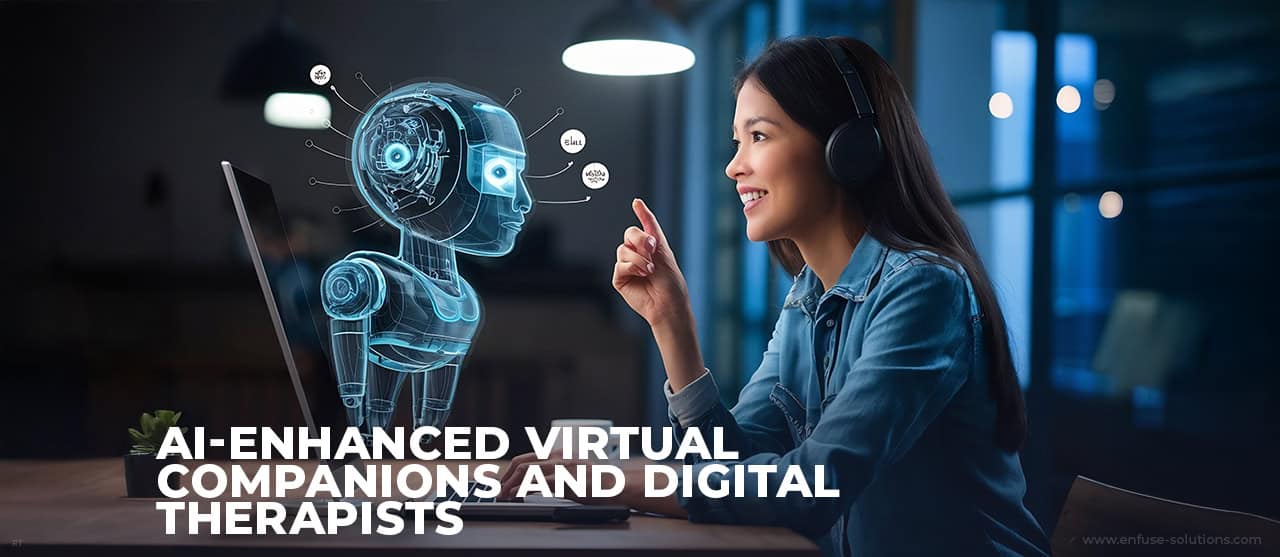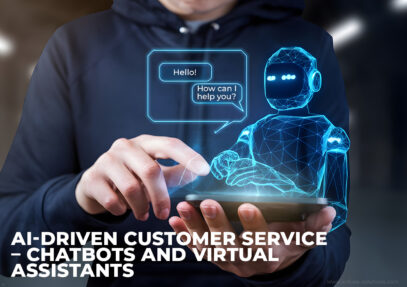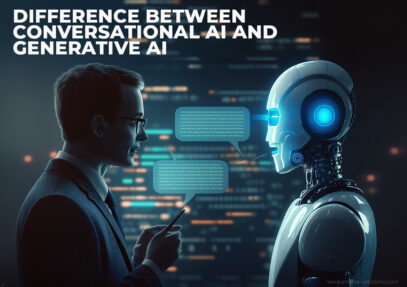
The mental health and wellness sector has been undergoing a digital revolution over the last decade, with AI-powered technologies at the forefront. In 2024, an estimated 970 million people globally suffer from mental health disorders, yet nearly three-quarters of them lack access to necessary treatment.
With rising demand, mental health support requires innovative solutions that are accessible, scalable, and effective. AI-enhanced virtual companions and digital therapists are emerging as transformative tools in this space, offering round-the-clock support, personalized interactions, and empathetic connections.
The Rise Of Virtual Companions And Digital Therapists
AI-driven virtual companions are designed to simulate human-like interactions, providing users with conversational support and, in some cases, cognitive-behavioral therapy techniques. Generative AI, an advanced branch of AI that uses neural networks to create content, plays a vital role in making these interactions realistic and meaningful.
As of 2023, AI in the mental health market is valued at $1.13 billion and is anticipated to grow at a CAGR of 24.1% from 2024 to 2030. This growth reflects the increasing reliance on AI solutions to bridge the mental health gap, particularly as they can offer scalable solutions without the geographical and time constraints associated with traditional therapy.
How AI-Enhanced Companions Work?
AI-enhanced virtual companions rely on natural language processing (NLP) and machine learning (ML) algorithms to understand, interpret, and respond to users in a way that feels human.
Here are some core elements that define the effectiveness of AI-powered virtual companions and digital therapists:
- Natural Language Processing (NLP): This allows AI companions to understand and respond to the nuances of human language, detecting underlying emotions and intent.
- Sentiment Analysis And Emotion Recognition: These technologies assess a user’s emotional state through language, tone, and even facial expressions (if video is involved). The AI then tailors responses to align with the user’s mood.
- Generative AI For Empathy Simulation: Advanced generative AI models, like those built on GPT (Generative Pre-trained Transformers), are trained to engage in empathetic dialogues, helping users feel understood and validated.
- Continuous Learning And Adaptation: Over time, AI-powered companions learn from their interactions, becoming better attuned to individual users’ needs, preferences, and triggers. This leads to increasingly personalized experiences.
AI’s Uses And Advantages For Mental Health And Wellness
1. 24/7 Accessibility And Immediate Support
AI-based virtual companions’ 24/7 availability is one of their biggest benefits. Users can access support whenever they need it, reducing barriers to entry and ensuring continuous support. For individuals who may not feel comfortable seeking face-to-face therapy, virtual companions provide a non-judgmental environment to express their thoughts and emotions freely.
2. Cost-Effective Mental Health Support
AI-enhanced mental health solutions have the potential to reduce the cost of traditional therapy significantly. According to a report by Deloitte, digital mental health interventions can cut down per-session costs significantly. Such affordability is crucial for expanding access to underserved communities and individuals with limited financial resources.
3. Personalized Therapy Sessions
By analyzing past conversations and responses, AI-based digital therapists can tailor therapy sessions to fit individual needs. This approach creates a level of personalization that often surpasses traditional therapy methods, with sessions specifically designed to address each user’s unique concerns, coping mechanisms, and mental health goals.
4. A Bridge To Traditional Therapy
For individuals on a waiting list for traditional therapy, virtual companions can serve as a critical stop-gap measure, offering immediate support and skill-building until they can connect with a human therapist. Additionally, these AI-enhanced tools can reinforce therapeutic skills learned in therapy, such as grounding techniques, mindfulness practices, and cognitive-behavioral strategies.
5. Eliminating Stigma Around Mental Health
Support for mental health is less stigmatized thanks to virtual companions. By providing a private, judgment-free platform for expression, AI companions encourage more people to seek assistance. According to a report by the American Psychological Association, more than 50% of people with untreated mental health issues avoid seeking help due to social stigma. Virtual companions can change this, allowing users to open up in a way that feels comfortable and safe.
Statistics And Market Projections
The digital health market, of which AI-enhanced virtual companions are a part, is booming. By 2031, the global mental health tech industry is projected to grow by 15.8% annually, reaching nearly $6824.5 million in 2024. Furthermore, studies indicate that AI-enhanced therapy is more effective than traditional self-help programs, underscoring its value as a supplement or alternative to traditional therapy.
According to Grand View Research, 79% of healthcare organizations are already using AI to enhance patient engagement, and the U.S. Department of Health projects that AI-enhanced mental health tools can cut treatment time by up to 40%. These numbers reflect an industry ripe for AI integration, as more healthcare providers look to incorporate AI-enhanced tools in mental health programs.
Ethical Considerations And Privacy Concerns
Excellent innovation necessitates ethical and privacy issues. AI-driven companions handle sensitive data, making it imperative for developers to ensure robust data privacy measures. AI companions should comply with regulations like HIPAA in the U.S. and GDPR in Europe to secure personal information.
Moreover, AI companions must be designed with transparency in mind, informing users about how their data is used and ensuring that their interactions remain confidential. The responsibility lies with developers to make ethical decisions regarding data usage, ensuring that the technology genuinely serves the users’ best interests.
EnFuse Solutions: Powering The Future Of AI-Driven Wellness
As a frontrunner in AI and digital solutions, EnFuse Solutions is dedicated to advancing health tech innovations by supporting the development of realistic, empathetic virtual companions and mental health assistants. EnFuse offers services in data annotation, sentiment analysis, and NLP, all essential for building advanced AI-driven companions capable of meaningful, human-like interactions.
Our team’s expertise ensures that AI solutions are finely tuned to reflect genuine empathy, and we prioritize compliance with industry regulations to protect users’ data. By collaborating with health tech organizations, EnFuse is creating impactful, scalable AI solutions that empower users worldwide with accessible mental health support.
Conclusion
AI-enhanced virtual companions and digital therapists are reshaping mental health and wellness by providing timely, personalized, and empathetic support. The demand for these tools continues to grow, driven by their accessibility, cost-effectiveness, and ability to cater to unique individual needs. EnFuse Solutions stands at the forefront of this revolution, committed to driving advancements in health tech and supporting the creation of ethical, secure, and impactful digital therapists.
If your organization is ready to explore how AI-driven companions can elevate your mental health offerings, partner with EnFuse Solutions to bring cutting-edge, empathetic AI support to your users. Get in touch with us today and help redefine the future of mental health and wellness.

















Comment